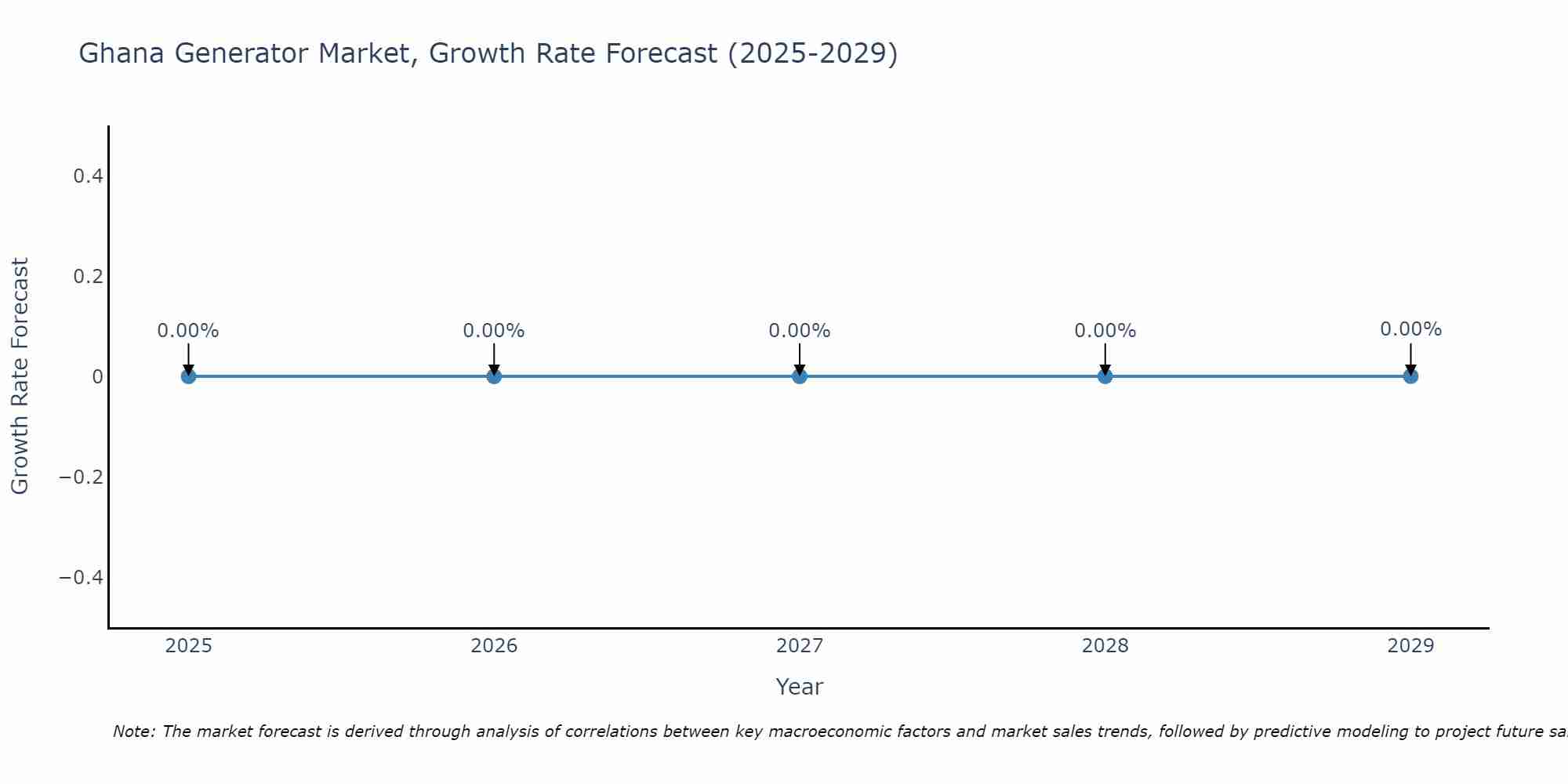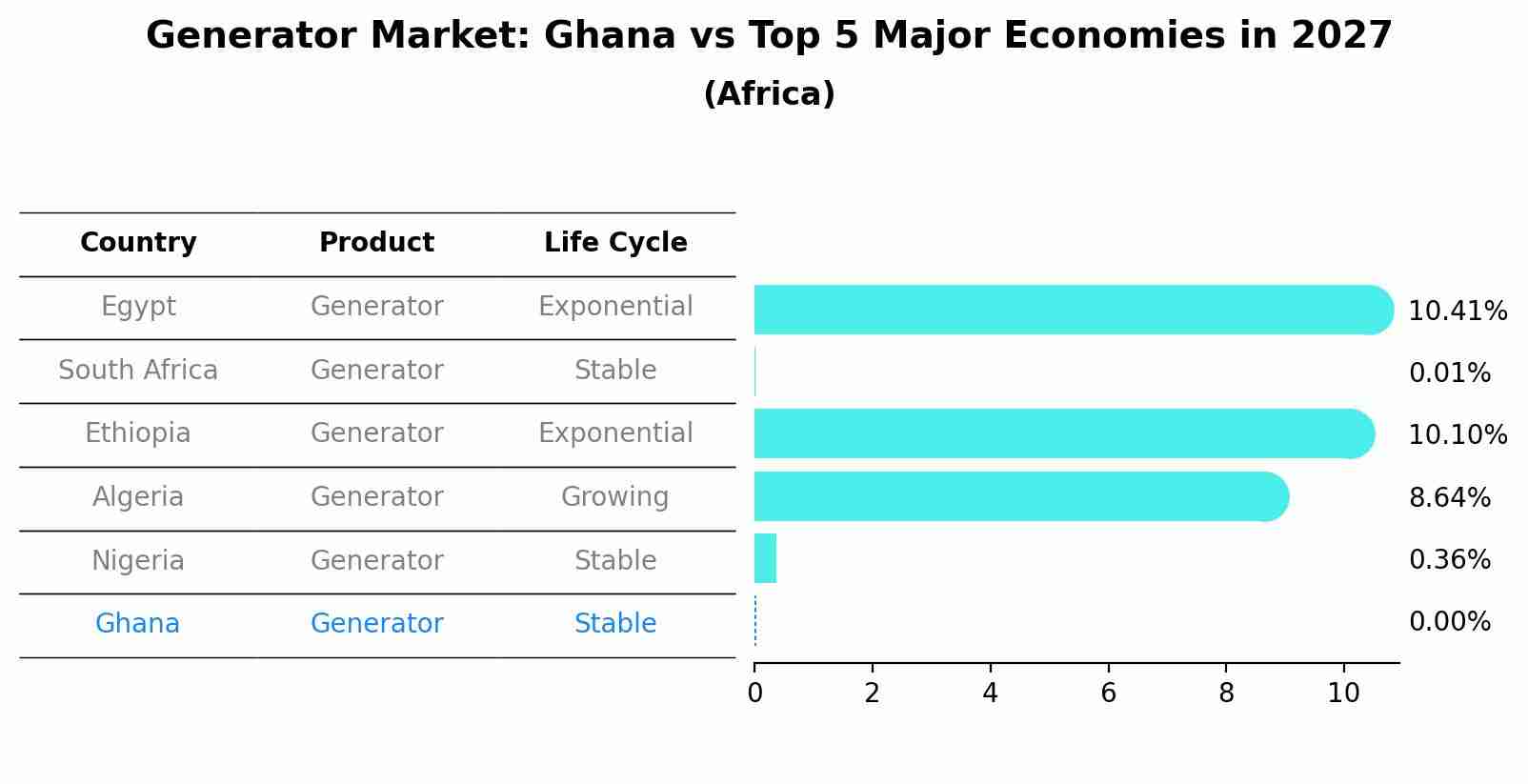Ghana Generator Market (2025-2031) Outlook | Companies, Size, Forecast, Revenue, Trends, Industry, Analysis, Value, Share & Growth
| Product Code: ETC364496 | Publication Date: Aug 2022 | Updated Date: Jul 2025 | Product Type: Market Research Report | |
| Publisher: 6Wresearch | Author: Ravi Bhandari | No. of Pages: 75 | No. of Figures: 35 | No. of Tables: 20 |
Ghana Generator Market Size Growth Rate
The Ghana Generator Market is likely to experience consistent growth rate gains over the period 2025 to 2029. The growth rate starts at 0.00% in 2025 and reaches 0.00% by 2029.

Generator Market: Ghana vs Top 5 Major Economies in 2027 (Africa)
The Generator market in Ghana is projected to grow at a stable growth rate of 0.00% by 2027, within the Africa region led by Egypt, along with other countries like South Africa, Ethiopia, Algeria and Nigeria, collectively shaping a dynamic and evolving market environment driven by innovation and increasing adoption of emerging technologies.

Ghana Generator Market Synopsis
The Ghana generator market is experiencing steady growth driven by increasing demand for reliable power sources due to frequent power outages. Factors such as rapid urbanization, industrial expansion, and a growing need for backup power solutions in residential, commercial, and industrial sectors contribute to market growth. Diesel generators dominate the market due to their affordability and efficiency, although there is a rising interest in cleaner and more sustainable options like natural gas and solar generators. Key players in the market include Cummins Inc., Caterpillar Inc., and Kohler Co., offering a range of products catering to various power needs. Government initiatives to improve the country`s power infrastructure and address electricity challenges also play a significant role in shaping the generator market landscape in Ghana.
Ghana Generator Market Trends
The Ghana generator market is experiencing a shift towards more energy-efficient and environmentally friendly solutions. Consumers are increasingly opting for generators that use cleaner fuel sources such as natural gas or biodiesel, in line with the global focus on sustainability. There is also a growing demand for generators with advanced features like remote monitoring capabilities and automatic power transfer switches for seamless operation during power outages. Moreover, the trend of decentralized power generation is gaining traction, with businesses and households investing in smaller, portable generators to provide backup power. Overall, the market is evolving towards more efficient, reliable, and environmentally conscious generator solutions to meet the diverse needs of consumers in Ghana.
Ghana Generator Market Challenges
In the Ghana generator market, several challenges are faced by both consumers and suppliers. One significant challenge is the high cost of generators, which can be a barrier for many individuals and businesses looking to invest in reliable power backup solutions. Additionally, the inconsistent supply of fuel and electricity in Ghana poses a challenge for the efficient operation of generators, as fuel availability and affordability can fluctuate. Another challenge is the lack of proper maintenance services and technical support for generators, leading to potential breakdowns and reduced lifespan of the equipment. Lastly, the presence of counterfeit products in the market undermines the credibility of genuine generator suppliers and can lead to performance issues and safety concerns for consumers. Addressing these challenges will be crucial for the sustainable growth of the generator market in Ghana.
Ghana Generator Market Investment Opportunities
The Ghana generator market presents various investment opportunities due to the country`s unreliable power supply and frequent blackouts. Investing in the distribution of high-quality generators, particularly those powered by renewable energy sources such as solar or wind, can cater to the increasing demand for reliable electricity in residential, commercial, and industrial sectors. Additionally, offering maintenance and repair services for generators can be a lucrative opportunity, as regular upkeep is essential for ensuring uninterrupted power supply. Furthermore, exploring rental services for generators to businesses and events can be a profitable venture in Ghana`s market. Overall, the Ghana generator market offers diverse investment avenues for those looking to capitalize on the growing need for dependable power solutions in the country.
Jordan Agar Market Government Policies
The government of Ghana has implemented various policies to regulate the generator market in the country. These policies include the Energy Sector Reforms, Renewable Energy Act, and the National Electrification Scheme. The Energy Sector Reforms aim to improve the efficiency and reliability of the electricity sector, thereby reducing the reliance on generators. The Renewable Energy Act promotes the use of clean energy sources, such as solar and wind power, to diversify the energy mix and reduce the environmental impact of generators. Additionally, the National Electrification Scheme focuses on expanding access to electricity in rural areas, which could potentially decrease the demand for generators in those regions. Overall, these policies reflect the government`s efforts to promote sustainable energy practices and reduce the dependence on generators in Ghana.
Ghana Generator Market Future Outlook
The future outlook for the Ghana generator market appears promising, driven by factors such as rapid urbanization, industrial growth, and unreliable power supply. The increasing demand for reliable electricity in both urban and rural areas is expected to fuel the market growth. Additionally, the government`s initiatives to improve the power sector infrastructure and promote renewable energy sources are likely to create opportunities for generator manufacturers and suppliers in the country. With the rising need for backup power solutions in various sectors including healthcare, telecommunications, and manufacturing, the Ghana generator market is anticipated to witness steady growth in the coming years, making it an attractive prospect for industry players looking to expand their presence in the region.
Key Highlights of the Report:
- Ghana Generator Market Outlook
- Market Size of Ghana Generator Market, 2024
- Forecast of Ghana Generator Market, 2031
- Historical Data and Forecast of Ghana Generator Revenues & Volume for the Period 2021 - 2031
- Ghana Generator Market Trend Evolution
- Ghana Generator Market Drivers and Challenges
- Ghana Generator Price Trends
- Ghana Generator Porter's Five Forces
- Ghana Generator Industry Life Cycle
- Historical Data and Forecast of Ghana Generator Market Revenues & Volume By Application for the Period 2021 - 2031
- Historical Data and Forecast of Ghana Generator Market Revenues & Volume By Stationary Generators for the Period 2021 - 2031
- Historical Data and Forecast of Ghana Generator Market Revenues & Volume By Portable Generators for the Period 2021 - 2031
- Historical Data and Forecast of Ghana Generator Market Revenues & Volume By Fuel for the Period 2021 - 2031
- Historical Data and Forecast of Ghana Generator Market Revenues & Volume By Diesel Generators for the Period 2021 - 2031
- Historical Data and Forecast of Ghana Generator Market Revenues & Volume By Gas Generators for the Period 2021 - 2031
- Historical Data and Forecast of Ghana Generator Market Revenues & Volume By End Use for the Period 2021 - 2031
- Historical Data and Forecast of Ghana Generator Market Revenues & Volume By Residential Generators for the Period 2021 - 2031
- Historical Data and Forecast of Ghana Generator Market Revenues & Volume By Commercial Generators for the Period 2021 - 2031
- Historical Data and Forecast of Ghana Generator Market Revenues & Volume By Industrial Generators for the Period 2021 - 2031
- Historical Data and Forecast of Ghana Generator Market Revenues & Volume By Others for the Period 2021 - 2031
- Historical Data and Forecast of Ghana Generator Market Revenues & Volume By Capacity for the Period 2021 - 2031
- Historical Data and Forecast of Ghana Generator Market Revenues & Volume By 0-100 kVA for the Period 2021 - 2031
- Historical Data and Forecast of Ghana Generator Market Revenues & Volume By 100-350 kVA for the Period 2021 - 2031
- Historical Data and Forecast of Ghana Generator Market Revenues & Volume By 350-1000kVA for the Period 2021 - 2031
- Historical Data and Forecast of Ghana Generator Market Revenues & Volume By Above 1000kVA for the Period 2021 - 2031
- Ghana Generator Import Export Trade Statistics
- Market Opportunity Assessment By Application
- Market Opportunity Assessment By Fuel
- Market Opportunity Assessment By End Use
- Market Opportunity Assessment By Capacity
- Ghana Generator Top Companies Market Share
- Ghana Generator Competitive Benchmarking By Technical and Operational Parameters
- Ghana Generator Company Profiles
- Ghana Generator Key Strategic Recommendations
Frequently Asked Questions About the Market Study (FAQs):
- Single User License$ 1,995
- Department License$ 2,400
- Site License$ 3,120
- Global License$ 3,795
Search
Related Reports
- Australia IT Asset Disposal Market (2025-2031) | Strategy, Consumer Insights, Analysis, Investment Trends, Opportunities, Growth, Size, Share, Industry, Revenue, Segments, Value, Segmentation, Supply, Forecast, Restraints, Outlook, Competition, Drivers, Trends, Demand, Pricing Analysis, Competitive, Strategic Insights, Companies, Challenges
- UAE Building Thermal Insulation Market Outlook (2025-2031) | Revenue, Companies, Share, Trends, Growth, Size, Forecast, Industry, Analysis & Value
- Portugal Electronic Document Management Market (2025-2031) | Strategy, Consumer Insights, Analysis, Investment Trends, Opportunities, Growth, Size, Share, Industry, Revenue, Segments, Value, Segmentation, Supply, Forecast, Restraints, Outlook, Competition, Drivers, Trends, Demand, Pricing Analysis, Competitive, Strategic Insights, Companies, Challenges
- France Electronic Document Management Market (2025-2031) | Strategy, Consumer Insights, Analysis, Investment Trends, Opportunities, Growth, Size, Share, Industry, Revenue, Segments, Value, Segmentation, Supply, Forecast, Restraints, Outlook, Competition, Drivers, Trends, Demand, Pricing Analysis, Competitive, Strategic Insights, Companies, Challenges
- Portugal Occupational Health & Safety Services Market (2025-2031) | Strategy, Consumer Insights, Analysis, Investment Trends, Opportunities, Growth, Size, Share, Industry, Revenue, Segments, Value, Segmentation, Supply, Forecast, Restraints, Outlook, Competition, Drivers, Trends, Demand, Pricing Analysis, Competitive, Strategic Insights, Companies, Challenges
- Netherlands Occupational Health and Safety Services Market (2025-2031) | Strategy, Consumer Insights, Analysis, Investment Trends, Opportunities, Growth, Size, Share, Industry, Revenue, Segments, Value, Segmentation, Supply, Forecast, Restraints, Outlook, Competition, Drivers, Trends, Demand, Pricing Analysis, Competitive, Strategic Insights, Companies, Challenges
- Belgium and Luxembourg Facility Management Market (2025-2031) | Strategy, Consumer Insights, Analysis, Investment Trends, Opportunities, Growth, Size, Share, Industry, Revenue, Segments, Value, Segmentation, Supply, Forecast, Restraints, Outlook, Competition, Drivers, Trends, Demand, Pricing Analysis, Competitive, Strategic Insights, Companies, Challenges
- Russia Women Intimate Apparel Market (2025-2031) | Strategy, Consumer Insights, Analysis, Investment Trends, Opportunities, Growth, Size, Share, Industry, Revenue, Segments, Value, Segmentation, Supply, Forecast, Restraints, Outlook, Competition, Drivers, Trends, Demand, Pricing Analysis, Competitive, Strategic Insights, Companies, Challenges
- Africa Chocolate Market (2025-2031) | Size, Share, Trends, Growth, Revenue, Analysis, Forecast, industry & Outlook
- Global Hydroxychloroquine And Chloroquine Market (2025-2031) | Industry, Trends, Size, Outlook, Growth, Value, Companies, Revenue, Analysis, Share, Forecast
Industry Events and Analyst Meet
Our Clients
Whitepaper
- Middle East & Africa Commercial Security Market Click here to view more.
- Middle East & Africa Fire Safety Systems & Equipment Market Click here to view more.
- GCC Drone Market Click here to view more.
- Middle East Lighting Fixture Market Click here to view more.
- GCC Physical & Perimeter Security Market Click here to view more.
6WResearch In News
- Doha a strategic location for EV manufacturing hub: IPA Qatar
- Demand for luxury TVs surging in the GCC, says Samsung
- Empowering Growth: The Thriving Journey of Bangladesh’s Cable Industry
- Demand for luxury TVs surging in the GCC, says Samsung
- Video call with a traditional healer? Once unthinkable, it’s now common in South Africa
- Intelligent Buildings To Smooth GCC’s Path To Net Zero













